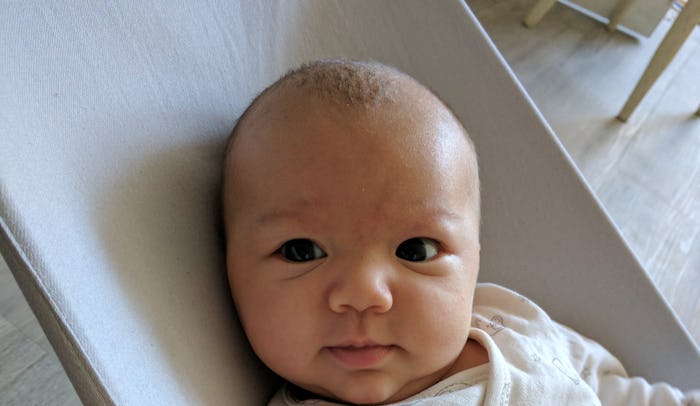Life

8 Ways To Remove That Unsightly Cradle Cap From Your Baby's Head
I was so grateful when my daughter was born with a full head of hair that stuck around for her entire babyhood. My son, on the other hand, wasn't so lucky. His sparse hair became even more sparse after he was born and at about six months, he developed cradle cap. It wasn't the worst I've seen, but it was certainly pretty yucky. And there's something about cradle cap that makes you nervous to try to get rid of it. Not anymore. You just need these hacks to remove cradle cap, because that stuff can look pretty awful.
Whether you're loosening the cradle cap with olive oil or cranking up the humidifier in your baby's room, there are lots of options to try to get rid of those scales on your baby's head. BabyCenter explained, "If your baby's scalp has flaky, dry skin that looks like dandruff, or thick, oily, yellowish or brown scaling or crusting patches, it's probably cradle cap." And while it's harmless and will likely go away on its own, it'll probably bug you. Of course you should get it checked out if it looks extreme, and if you're not familiar with it. Luckily you can help it on its way by using one or all of these at-home cradle cap hacks. Just make sure to ask your pediatrician before you use medicated shampoos or essential oils.
1Coconut Oil
Most oils, like coconut, jojoba and even olive oil, can help loosen the cradle cap flakes on your baby's head. Slather on a generous amount of oil, then "massage the oil directly onto your baby’s scalp and leave for about 20 minutes" before you move on to the next step, recommended Belly Belly.
2Cradle Cap Brush
Safety First cradle cap brush, $5, Amazon
I'll admit I let my sister go at my son's cradle cap with a toothbrush, which worked, but made his head red for a bit. It was probably not my finest parenting moment, especially since there are soft brushes designed specifically to gently get rid of cradle cap. If only I'd known — he might not have lost so much hair!
3Aloe Vera
You probably have some aloe vera gel sitting in the cupboard from the last time someone got a sunburn. You can use that to help treat cradle cap. Optiderma instructed to wash your baby's head, dry it thoroughly, and to then apply a thick layer of aloe vera afterwards to moisturize the scalp.
4Shampoo
One theory as to the cause of cradle cap is that it's from overactive oil glands in a baby's scalp. Baby Center reminded parents not to skip the shampoo at tub time when your baby has cradle cap. "The last thing you want to do is leave oil on your baby's head, which could clog the pores and cause the flakes to stick. Try leaving the shampoo on for a few minutes before rinsing, to help cut the oil," the site explained.
5Dandruff Shampoo
While you'll likely want to check with your pediatrician before using a medicated dandruff shampoo on your baby, it could be exactly what gets rid of the cradle cap. Dr. Sears reported, "You can get rid of cradle cap once and for all using dandruff shampoo (either a selenium or a tar based shampoo is fine) twice a week for several weeks."
6Humidifier
Search Herbal Remedy explained, "Dryness is a big reason behind worsening the cradle cap and its recurrence," so adding a humidifier to your home or your baby's room can help to add moisture to the air and reduce the cradle cap on his head.
7Supplements
If your baby is eating solids, they might benefit from taking in more Omega-3's, according to Mama Natural. The site recommended that both Omega 3s and vitamin D can help combat cradle cap by improving the general health of the skin. "These can be taken as supplements, or increased in the diet through food." If you're breastfeeding, "biotin, zinc, B6, selenium, and manganese can help remedy cradle cap," the site explained.
8Baby Probiotic
Some doctors and nutrition experts believe cradle cap starts in the gut, so a baby probiotic might help clear it up. Naturopathic Pediatrics explained that a probiotic is "important for good digestion, immune health, and other body functions." Just make sure it's a probiotic that's suitable for babies.